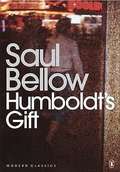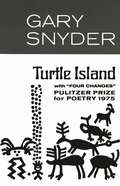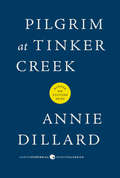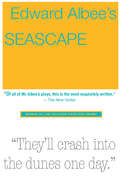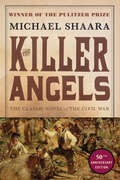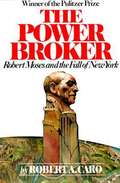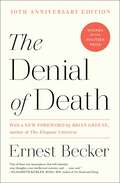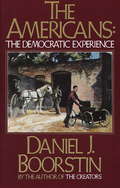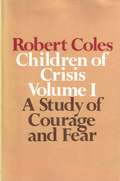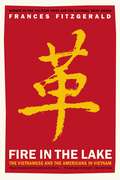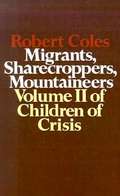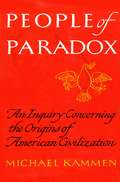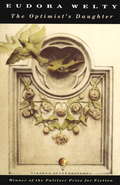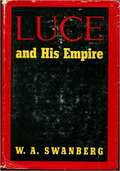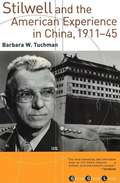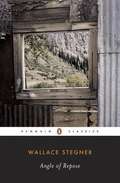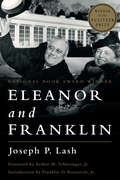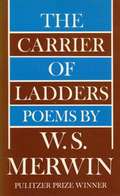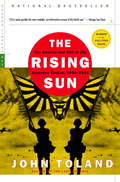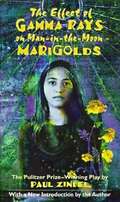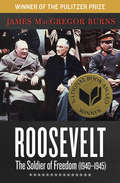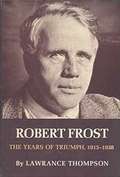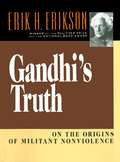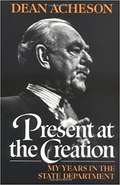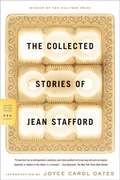Special Collections
Pulitzer Prize Award Winners
Description: Bookshare is pleased to offer the following titles, winners of the Pulitzer Prize Award. Note: Some drama winners are available and are listed under Fiction awards. #award
- Table View
- List View
Humboldt's Gift
by Saul BellowHumboldt's Gift is the story about Charlie Citrine who posthumously receives a gift from the poet Von Humboldt Fleischer that changes the way he views himself and the world. Long Synopsis: In Saul Bellow's Humboldt's Gift, the main protagonist, Charlie Citrine, a successful writer, is an intellectual who is tormented by feelings of emptiness and by disturbing recollections. In his youth, his love of literature causes him to befriend the poet Von Humboldt Fleischer. While he is alive, Fleischer becomes Citrine's mentor and teaches him the importance of the spiritual and sparks his interest in intellectual pursuits. Through Fleischer's death along with other experiences and associations, Citrine learns how to integrate his spirituality and intellectuality with the mundane. Throughout the novel, Citrine grapples with the question of how the human being with an infinite soul is going to live in the often anti-human and materialistic society and culture. Charlie is reawakened to his responsibilities. Equally important as asking this question, Citrine finds the courage to continue in his life which is plagued by paradoxes and uncertainties. In the end of the novel, he is awakened to his responsibilities and learns to become involved in everyday reality.
Pulitzer Prize Winner
Turtle Island
by Gary SnyderWinner of the Pulitzer Prize for Poetry (1975). These Pulitzer Prize-winning poems and essays by the author of No Nature range from the lucid, lyrical, and mystical to the political. All, however, share a common vision: a rediscovery of North America and the ways by which we might become true natives of the land for the first time.
Pilgrim at Tinker Creek
by Annie DillardPilgrim at Tinker Creek is the story of a dramatic year in Virginia's Blue Ridge valley.
Annie Dillard sets out to see what she can see. What she sees are astonishing incidents of "mystery, death, beauty, violence."
Seascape
by Edward AlbeeDealing with an almost surreal Howard Hughes-like figure, a bearded recluse who is the richest man in the world, this often comic and brilliantly revealing allegory continues the playwright's preoccupation with the mythic aspects of American life.
Pulitzer Prize Winner
The Killer Angels
by Michael ShaaraPULITZER PRIZE WINNER • NEW YORK TIMES BESTSELLER • The &“remarkable&” (Ken Burns), &“utterly absorbing&” (Forbes) Civil War classic that inspired the film Gettysburg, with more than three million copies in print—now in a 50th anniversary edition featuring a new introduction by Jeff Shaara&“My favorite historical novel . . . a superb re-creation of the Battle of Gettysburg, but its real importance is its insight into what the war was about, and what it meant.&”—James M. McPherson In the four most bloody and courageous days of our nation&’s history, two armies fought for two conflicting dreams. One dreamed of freedom, the other of a way of life. Far more than rifles and bullets were carried into battle. There were memories. There were promises. There was love. And far more than men fell on those Pennsylvania fields. Bright futures, untested innocence, and pristine beauty were also the casualties of war. Michael Shaara&’s Pulitzer Prize–winning masterpiece is unique, sweeping, unforgettable—the dramatic story of the battleground for America&’s destiny.
The Power Broker
by Robert A. CaroThe Power Broker tells the hidden story behind the shaping (and mis-shaping) of twentieth-century New York (city and state) and makes public what few have known: that Robert Moses was, for almost half a century, the single most powerful man of our time in New York, the shaper not only of the city's politics but of its physical structure and the problems of urban decline that plague us today. In revealing how Moses did it--how he developed his public authorities into a political machine that was virtually a fourth branch of government, one that could bring to their knees Governors and Mayors (from La Guardia to Lindsay) by mobilizing banks, contractors, labor unions, insurance firms, even the press and the Church, into an irresistible economic force--Robert Caro reveals how power works in all the cities of the United States. Moses built an empire and lived like an emperor. He personally conceived and completed public works costing 27 billion dollars--the greatest builder America (and probably the world) has ever known. Without ever having been elected to office, he dominated the men who were--even his most bitter enemy, Franklin D. Roosevelt, could not control him--until he finally encountered, in Nelson Rockefeller, the only man whose power (and ruthlessness in wielding it) equalled his own.
Pulitzer Prize Winner
The Denial of Death
by Ernest BeckerWinner of the Pulitzer Prize, The Denial of Death explores how people and cultures around the world have reacted to the concept of death from celebrated cultural anthropologist Ernest Becker.Winner of the Pulitzer Prize in 1974 and the culmination of a life&’s work, The Denial of Death is Ernest Becker&’s brilliant and impassioned answer to the &“why&” of human existence. In bold contrast to the predominant Freudian school of thought, Becker tackles the problem of the vital lie—man&’s refusal to acknowledge his own mortality. In doing so, he sheds new light on the nature of humanity and issues a call to life and its living that still resonates decades after its writing.
The Americans
by Daniel J. BoorstinWinner of the Pulitzer Prize. A study of the last 100 years of American history.From the Trade Paperback edition.
Children of Crisis
by Robert ColesThe notoriety of this book rests on two pretty shaky pillars: first, the initial section of the book is supposed to reveal the effects of segregation and desegregation battles on children, mainly through their drawings, which have become almost iconographic; second, the book was the first major effort to look at segregationists as if they were normal human beings and not vile mutants. But the child studies seem dubious and the novelty of the even handed treatment of white Southerners is more of an indictment of the prevailing intellectual hegemony of the 60's than a recommendation for this book in particular.
Pulitzer Prize Winner
Fire in the Lake
by Frances FitzgeraldThis landmark work, based on Frances FitzGerald's own research and travels, takes us inside Vietnam into the traditional, ancestor-worshiping villages and the corrupt crowded cities, into the conflicts between Communists and anti-Communists, Catholics and Buddhists, generals and monks and reveals the country as seen through Vietnamese eyes.
With a clarity and authority unrivaled by any book before it or since, Fire in the Lake shows how America utterly and tragically misinterpreted the realities of Vietnam.
Winner of the Pulitzer Prize
Winner of the National Book Award
Migrants, Sharecroppers, Mountaineers (Volume 2 of Children of Crisis)
by Robert ColesSince the late 1950's, Robert Coles has been studying, living with, and, above all, listening to the American poor. The result is one of the most vigorous and searching social studies ever undertaken by one man in the United States. Migrants, Sharecroppers, Mountaineers is the second volume in Dr. Coles's award-winning series, Children of Crisis. In it, he listens to three groups: the migrant workers who travel the eastern coast of this country, picking crops day after day; the sharecroppers and tenant farmers who live on isolated southern plantations, just as their ancestors did as slaves; and the mountaineers of Appalachia, whose only choice lies between coal mining and starvation.
Pulitzer Prize Winner
People of Paradox
by Michael KammenFrom the beginning, what has given our culture its distinctive texture, pattern, and thrust, according to Michael Kammen, is the dynamic interaction of the imported and the indigenous. He shows how, during the years of colonization, some ideas and institutions were transferred virtually intact from Britain, while, simultaneously, others were being transformed in the New World. As he unravels the tangled origins of our culture, he makes us see that unresolved contradictions in the American experience have created our national style. Puritanical and hedonistic, idealistic and materialistic, peace-loving and war-mongering: these opposing strands go back to the genesis of our history.
Pulitzer Prize Winner
The Optimist's Daughter
by Eudora WeltyA young woman who has left the South, returns to New Orleans several years later when her father is dying. After his death, she and her young stepmother go back to the small Mississippi town where she grew up. Alone in the old house, Laurel finally comes to an understanding of the past and herself. Copyright © Libri GmbH. All rights reserved.
Luce and His Empire
by W. A. SwanbergHenry Luce started Time magazine in the 1940's and went on to create a media empire. He married Clare Booth Luce who became ambassador to Italy.
Pulitzer Prize Winner
Stilwell and the American Experience in China, 1911-45
by Barbara W. TuchmanBarbara W. Tuchman uses the life of Joseph Stilwell, the military attache to China in 1935-39 and commander of United States forces and allied chief of staff to Chiang Kai-shek in 1942-44, to explore the history of China from the revolution of 1911 to the turmoil of World War II, when China's Nationalist government faced attack from Japanese invaders and Communist insurgents. Her story is an account of both American relations with China and the experiences of one of our men on the ground. In the cantankerous but level-headed "Vinegar Joe," Tuchman found a subject who allowed her to perform, in the words of The National Review, "one of the historian's most envied magic acts: conjoining a fine biography of a man with a fascinating epic story."
Pulitzer Prize Winner
Angle of Repose
by Wallace Stegner and Jackson J. BensonStegner’s Pulitzer Prize-winning novel of personal, historical, and geographic discovery Confined to a wheelchair, retired historian Lyman Ward sets out to write his grandparents' remarkable story, chronicling their days spent carving civilization into the surface of America's western frontier. But his research reveals even more about his own life than he's willing to admit. What emerges is an enthralling portrait of four generations in the life of an American family. "Cause for celebration . . . A superb novel with an amplitude of scale and richness of detail altogether uncommon in contemporary fiction." —The Atlantic Monthly"Brilliant . . . Two stories, past and present, merge to produce what important fiction must: a sense of the enchantment of life." —Los Angeles Times This Penguin Classics edition features an introduction by Jackson J. Benson.For more than sixty-five years, Penguin has been the leading publisher of classic literature in the English-speaking world. With more than 1,500 titles, Penguin Classics represents a global bookshelf of the best works throughout history and across genres and disciplines. Readers trust the series to provide authoritative texts enhanced by introductions and notes by distinguished scholars and contemporary authors, as well as up-to-date translations by award-winning translators.
Eleanor and Franklin
by Joseph P. LashIn his extraordinary biography of the major political couple of the twentieth century, Joseph P. Lash reconstructs from Eleanor Roosevelt's personal papers her early life and four-decade marriage to the four-time president who brought America back from the Great Depression and helped to win World War II. The result is an intimate look at the vibrant private and public worlds of two incomparable people.
Winner of the Pulitzer Prize
Winner of the National Book Award
The Carrier of Ladders
by W. S. MerwinPulitzer Prize for Poetry 1971. Merwin has since won a National Book Award for his selected poems and the 2009 Pulitzer for the Shadow of Sirius.
The Rising Sun
by John TolandThis history of World War II chronicles the dramatic rise and fall of the Japanese empire, from the invasion of Manchuria and China to the atomic bombing of Hiroshima and Nagasaki. Told from the Japanese perspective, The Rising Sun is, in the author's words, "a factual saga of people caught up in the flood of the most overwhelming war of mankind, told as it happened--muddled, ennobling, disgraceful, frustrating, full of paradox."In weaving together the historical facts and human drama leading up to and culminating in the war in the Pacific, Toland crafts a riveting and unbiased narrative history. In his Foreword, Toland says that if we are to draw any conclusion from The Rising Sun, it is "that there are no simple lessons in history, that it is human nature that repeats itself, not history."
Pulitzer Prize Winner
The Effect of Gamma Rays on Man-in-the-Moon Marigolds
by Paul ZindelBeatrice was a mother...and the embittered ringmaster of the circus Hunsdorfer featuring three generations of crazy ladies living under the sloppiest big top on earth. Nanny was no problem. She sat and stared and stayed silent as a venerable vegetable should. Ruth was half-mad and easily bought with an occasional cigarette. But how is the world would Beatrice control Tillie--keeper of rabbits, dreamer of atoms, true believer in life, hope, and the effect of gamma rays on man-in-the-moon marigolds...
Pulitzer Prize Winner
Roosevelt
by James MacGregor BurnsThe &“engrossing&” Pulitzer Prize and National Book Award–winning history of FDR&’s final years (Barbara Tuchman). The second entry in James Macgregor Burns&’s definitive two-volume biography of Franklin Delano Roosevelt begins with the president&’s precedent-breaking third term election in 1940, just as Americans were beginning to face the likelihood of war. Here, Burns examines Roosevelt&’s skillful wartime leadership as well as his vision for post-war peace. Hailed by William Shirer as &“the definitive book on Roosevelt in the war years,&” and by bestselling author Barbara Tuchman as &“engrossing, informative, endlessly readable,&” The Soldier of Freedom is a moving profile of a leader gifted with rare political talent in an era of extraordinary challenges, sacrifices, heroism, and hardship.
Robert Frost
by Lawrance ThompsonRobert Frost: The Years of Triumph, 1915-1938. Volume two of Thompson's Frost biography receives a Pulitzer Prize despite the controversy raised by Thompson's less-than-sympathetic portrait of this American literary giant.
Gandhi's Truth
by Erik H. EriksonIn this study of Mahatma Gandhi, psychoanalyst Erik H. Erikson explores how Gandhi succeeded in mobilizing the Indian people both spiritually and politically as he became the revolutionary innovator of militant non-violence and India became the motherland of large-scale civil disobedience.
Winner of the National Book Award
Pulitzer Prize Winner
Present at the Creation
by Dean AchesonIn these memoirs by the former Secretary of State, Dean Acheson sees himself as having been "present at the creation" of the American century. Acheson's policies were praised by many and damned by others, including Joseph McCarthy.
Pulitzer Prize Winner
The Collected Stories of Jean Stafford
by Jean StaffordThese Pulitzer Prize-winning stories represent the major short works of fiction by one of the most distinctively American stylists of her day.
